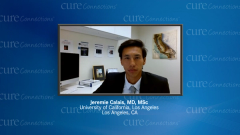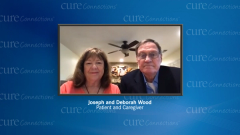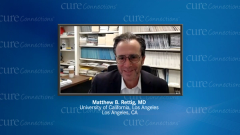
Emergence of PSMA Targeted Radioligand Therapy
Dr Jeremie Calais talks about the emergence and importance of PSMA-targeted radioligand therapy.
Episodes in this series

Alicia Morgans, MD: Nuclear medicine specialists play a big role in particular as we talk about radiopharmaceuticals and radioligand therapies. Jeremie, can you talk about your role as a nuclear medicine specialist? When are you getting engaged with patients, and how do we best work together?
Jeremie Calais, MD, MSc: As mentioned when we were talking about imaging, we are primarily imaging specialists, so patients have been referred to us to do a scan, and then we give our expertise in terms of reading those images. In this case, we assess where the PSMA [prostate-specific membrane antigen] is expressed. Now, with the new PSMA radiopharmaceutical therapy agents, they are administered in nuclear medicine clinics and are ordered by nuclear medicine physicians because it’s radioactive and must be administered in the nuclear medicine clinic with nuclear medicine technicians, specialized nurses and physicians, so these patients are now coming to us for these therapies. At the beginning of PSMA therapy, when it was starting here at UCLA [University of California, Los Angeles], people were really end-stage. They came to us when there was no other option for them. This is now changing, and I think the more we see good data on this radiation PSMA therapy, the more radiation PSMA therapy will be in the mind and the thoughts of Dr. Rettig or other medical oncologists as another option for his patients. If he thinks about radium or lutetium PSMA, then he would refer the patient to us, and then we would consult with the patient and answer all the questions the patient may have, specifically with radiation protection, radiation safety, but also all the experience with the combination of imaging-based approach linked to treatment.
Alicia Morgans, MD: Thank you for running through that. I wonder, from your perspective, given the list that Dr Rettig just mentioned of all these different therapies, how does PSMA-targeted radioligand therapy impact that list and the trajectory of a patient through all of those therapies from your perspective?
Jeremie Calais, MD, MSc: I think what really drives the hype, so far, with lutetium PSMA since about 2015, when it started mostly in Germany, is that we have such incredible stories never before seen. A patient refractory to multiple treatments, you do the scan, you see disease everywhere, and sometimes you obtain a very impressive response with very low toxicity, low side effect profile, the PSA [prostate-specific antigen] goes down, and the patient gets clean on the image. These stories were very rare before, but now this drug is being used more and more. I think we see by using it earlier and moving it to an earlier stage with less resistant disease, a disease that has received fewer prior therapies such as chemotherapy and such, as explained by Dr Rettig, the more the disease receives treatment, the more resistant it gets. I think the more we move the therapy to earlier stages, we’ll have even more success stories like that.
Alicia Morgans, MD: I hope so.
Transcript edited for clarity.








